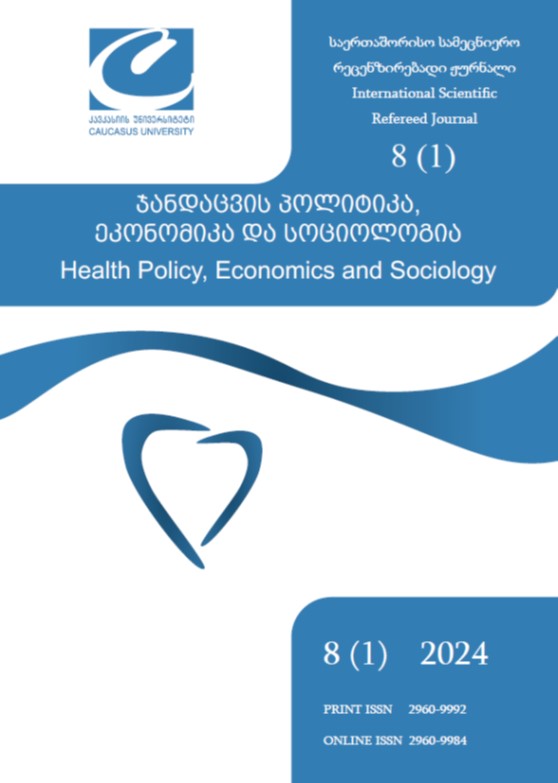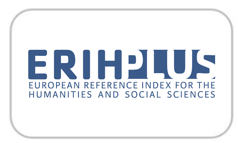აღზრდის სტილი ზეგავლენა თვითშეფასებზე და მისი როლი მენტალური ჯანმრთელობისთვის
DOI:
https://doi.org/10.52340/healthecosoc.2024.08.01.10საკვანძო სიტყვები:
აღზრდის სტილი, ადაპტაციის დონე, ჯანმრთელი ფუნქციონირება, თვითშეფასება, საზოგადოებრივი ჯანმრთელობაანოტაცია
შესავალი: საზოგადოებრივი ჯანმრთელობა მრავალკომპონენტიანი კონსტრუქტია, რომლის ერთერთი შემადგენელი კომპონენტი არის ფსიქიკური და ფსიქოლოგიური ასპექტი და მნიშვნელოვან როლს ასრულებს ჯანმრთელობის მთლიანობის შენარჩუნებაში. ამიტომაც დღეს მეტად აქტუალურია ისეთი ფსიქოლოგიური ასპექტების შესწავლა, როგორიცაა თვითშეფასება, ფსიქოლოგიური კეთლდღეობა, ადაპტაციის დონე, მედეგობა და მათი ზეგავლენის კვლევა ინდივიდის ჯანსაღ ფუნქციონირებაზე. აგრეთვე მნიშვნელოვანია ამ ფსიქოლოგიური ფაქტორების ჩამოყალიბების და მათზე ზემოქმედების მქონე ცვლადების შესწავლა. ნაშრომის მიზანია სხვა ფსიქოლოგიურ კომპონენტებთან ერთად თვითშეფასების როლის და მისი ზეგავლენის შესწავლა ადაპტაციის დონეზე და აღზრდის სტილის ზემოქმედების კვლევას თვითშეფასების ჩამოყალიბებაზე. მეთოდოლოგია: თვისებრივი კვლევის ფარგლებში ჩატარდა 6 მდედრობითი სქესის და 3 მამრობითი სქესის პირის გამოკითხვა. შედეგები: ადეკვატური (საშუალო შეფასების ზედა ზღვარი) თვითშეფასება დადებით ზეგავლენას ახდენს ადაპტაციის დონეზე, რადგან ამ ტიპის შეფასების მქონე ცდისპირებს შენარჩუნებული აქვთ რეალისტური დამოკიდებულება და ჯანსაღი კრიტიკა საკუთარი თავის მიმართ. აღზრდის ავტორიტეტული სტილი ხელს უწყობს ადეკვატური თვითშეფასების ჩამოყალიბებას, ხოლო აღზრდის ავტორიტარული სტილი უარყოფით ზეგავლენას ახდენს თვიშეფასების ჩამოყალიბებაზე. დასკვნა: მოსახლეობის გათვითცნობიერებულობის დონის ამაღლება აღზრდის სტილთან დაკავშირებით აუცილებელია და ამ პრობლემის მართვა და მიზნობრივი პროგრამების შემუშავება უნდა ითავონ პირველ რიგში სკოლებმა და შესაბამისმა სახელმწიფო სტურქტურებმა.
წყაროები
Barrowclough C, Tarrier N, Humphreys L, Ward J, Gregg L, Andrews B. (2003). Self-esteem in schizophrenia: relationships between self-evaluation, family attitudes, and symptomatology. J Abnorm Psychol. 112(1):92-9.
Butler, R., & Bauld, L. (2005). The parents’ experience: coping with drug use in the family. Drugs: Education, Prevention and Policy, 12(1), 35–45. https://doi.org/10.1080/0968763042000275308.
Baumeister RF, Campbell JD, Krueger JI, Vohs KD. Does High Self-Esteem Cause Better Performance, Interpersonal Success, Happiness, or Healthier Lifestyles? Psychol Sci Public Interest. 2003 May;4(1):1-44.
Britto PR, Lye SJ, Proulx K, Yousafzai AK, Matthews SG, Vaivada T, Perez-Escamilla R, Rao N, Ip P, Fernald LCH, MacMillan H, Hanson M, Wachs TD, Yao H, Yoshikawa H, Cerezo A, Leckman JF, Bhutta ZA; Early Childhood Development Interventions Review Group, for the Lancet Early Childhood Development Series Steering Committee. Nurturing care: promoting early childhood development. Lancet. 2017 Jan 7;389(10064):91-102. doi: 10.1016/S0140-6736(16)31390-3.
Damon M, Cole DH, Ostrom E, Sterner T. (2019), Grandfathering: Environmental Uses and Impacts. Review of Environmental Economics and Policy 13(1).
Darling & Steinberg, (2017), Parenting Style as Context: An Integrative Model In Book: Interpersonal Development (pp.161-170)
DeLongis, A., Folkman, S., & Lazarus, R. S. (1988). The impact of daily stress on health and mood: Psychological and social resources as mediators. Journal of Personality and Social Psychology, 54(3), 486–495.
Eccles & Harold (1993), Parent-school involvement during the early adolescent years. Journal ArticleDatabase: APA PsycInfo. Teachers College Record, 94(3), 568–587.
Evans et al.,( 2020), Characterising the evidence base for advanced clinical practice in the UK: a scoping review protocol 0(5):e036192. Pub. Med.
Ge, X., Conger, R. D., Cadoret, R. J., Neiderhiser, J. M., Yates, W., Troughton, E., & Stewart, M. A. (1996). The developmental interface between nature and nurture: A mutual influence model of child antisocial behavior and parent behaviors. Developmental Psychology, 32(4), 574–589. https://doi.org/10.1037/0012-1649.32.4.574
Hines & Holcomb-McCoy. (2013). Parental Characteristics, Ecological Factors, and the Academic Achievement of African American Males. Journal of counseling and development, 91(1).
Henning ER, Turk CL, Mennin DS, Fresco DM, Heimberg RG. (2007). Impairment and quality of life in individuals with generalized anxiety disorder. Depress Anxiety. 24(5):342-9.
Kohlberg, L. (1964) Development of Moral Character and Moral Ideology. In: Hofmann, M.L., Hofmann, L.W., Eds., Review of Child Development Research. Russell Sage Foundation, New York.
Kossek & Ozeki (1998). Work-Family Conflict, Policies, and The Job-Life Satisfaction Relationship: A Review and Directions for Organizational Behavior-Human Resources Research Journal of Applied Psychology 83(2):139-149
Kuczynski, L. (2003). Beyond Bidirectionality: Bilateral Conceptual Frameworks for Understanding Dynamics in Parent-Child Relations. In L. Kuczynski (Ed.), Handbook of Dynamics in Parent-Child Relations (pp. 3-24). Thousand Oaks, CA: SAGE Publishing.
Lauer L, Gould D, Roman N, Pierce M. (2010), Parental behaviors that affect junior tennis player development. Psychology of Sport and Exercise 11(6):487-496
Orth U, Robins RW, Trzesniewski KH, Maes J, Schmitt M. (2009). Low self-esteem is a risk factor for depressive symptoms from young adulthood to old age. J Abnorm Psychol. 118(3):472-8.
Rohner, R. P., & Britner, P. A. (2002). Worldwide mental health correlates of parental acceptance–rejection: Review of cross-cultural and intracultural evidence. Cross-Cultural Research: The Journal of Comparative Social Science, 36(1), 15–47.
Rohner, RP, Britner PA. (2005), Parental Acceptance-Rejection Theory, Methods, and Implications. Volume 36, Issue 1 In book: Handbook for the Study of Parental Acceptance and Rejection.1-35.
Turiel, E. (2008). Thought about actions in social domains: Morality, social conventions, and social interactions. Cognitive Development, 23(1), 136–154.
Sanvictores T, Mendez MD. (2022). Types of Parenting Styles and Effects On Children. In: StatPearls [Internet]. Treasure Island (FL): StatPearls Publishing; 2024
Spera C. (2005), A Review of the Relationship among Parenting Practices, Parenting Styles, and Adolescent School Achievement. Educational Psychology Review, 17, 125-146.
Van IJzendoorn & Juffer, (2006 ), Adoption as intervention. Meta-analytic evidence for massive catch-up and plasticity in physical, socio-emotional, and cognitive development. The Journal od Child Psychology and Psichiatry. 47(12):1228-45. doi: 10.1111/j.1469-7610.2006.01675.x.
Wenar C, Kerig P (2000), Developmental psychopathology: From infancy through adolescence (4th ed.). McGraw-Hill.
Wood et al., (2003), Parenting and childhood anxiety: Theory, empirical findings, and future directions Source: PubMed.
Zaki, J, Williams WC. (2013). Interpersonal Emotion Regulation, Emotion 13(5):803-810.
Zeigler-Hill, V., Abraham, J. (2006). Borderline personality features: Instability of Self-Esteem and Affect. Journal of Social and Clinical Psychology, 25(6), 668–687.
V. Zeigler-Hill ( 2010). The Connections Between Self-Esteem and Psychopathology. Journal of Contemporary Psychotherapy.














